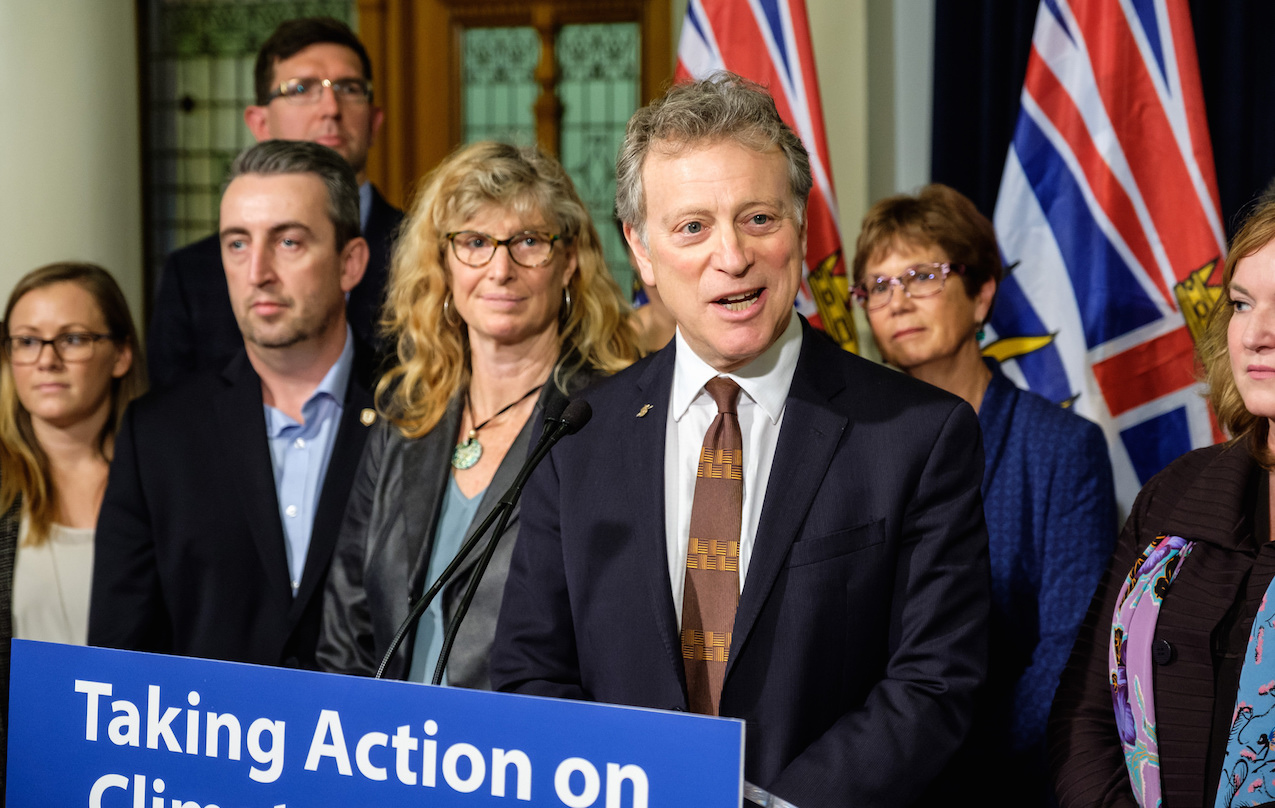I’m not going to try to go all legal scholarly on you, dear readers, but I’ll tell you one thing about the B.C. government’s announcement yesterday on how it would control how much bitumen can flow down the pipelines and rail lines through the province and Alberta’s response to it: It’s about 90 per cent politics and 10 per cent law.
That is to say, I don’t think British Columbia’s NDP-Green coalition government has much hope in the long run of succeeding with a legal defence of its plan to implement oil transportation restrictions on increases in the amount of diluted bitumen that can be shipped by rail or pipeline, despite the sincere hopes of many people on the West Coast.
After all, we’re talking about interprovincial trade, international trade, water and oceans, all of which are federal responsibilities under Canada’s Constitution, as well as a resource that comes from Alberta, over which it would be hard for British Columbia to assert a legal argument for control. So from that perspective, the B.C. government’s chances of success in court seem small.
In other words, Alberta’s NDP premier was likely right when she responded to the plan announced by B.C. Environment Minister George Heyman yesterday by asserting it is ultra vires and therefore unconstitutional.
Rachel Notley was also certainly correct when she said in an official statement, “therefore, the action announced today by the B.C. government can only be seen for what it is: political game-playing.”
But when she accused the B.C. government of “grasping at straws,” she may have been ignoring the point of the British Columbians’ strategy. Ms. Notley is no dummy, of course. She understands what Mr. Heyman was up to, and why. So her omission was intentional.
That’s the point, though, isn’t it? Politics matter. And politics matter because they get results, sometimes when the law says otherwise.
And this is a complex political fight that, while it appears to pit two NDP governments ironically against one another, actually involves a lot more players — including the Liberal federal government, right-wing opposition parties in Ottawa, Victoria and Edmonton, large blocks of voters determined to block pipelines or push them through no matter what the costs to the country depending upon where they live, and a powerful industry that may be in a far more precarious financial position than many of us imagine.
The NDP governments in Victoria and Edmonton would both like to stay in power. They have electorates who essentially take opposite views of the question at issue. They have legislative oppositions that want to exploit their differences without tripping over the same hazards.
The B.C. Government of Premier John Horgan in particular, having just backed away from cancelling the Site C hydroelectric project on the Peace River, needs desperately to shore up its environmental credibility with voters on the Coast who feel betrayed by that decision. If they don’t succeed, their precarious government’s Green partners could pull the plug on their governing agreement.
And pipelines look like the B.C. Greens’ hill to die on — or perhaps the one on which they can cobble together a historic victory.
Meanwhile, if the oil industry, as some environmentalists and business analysts think, is shakier than we’ve been led to believe, it may not take much to make pipeline investors run away from a project like Kinder Morgan’s Trans-Mountain Pipeline expansion project, which is extremely unpopular in the Vancouver area and is the proximate cause of Mr. Heyman’s announcement yesterday.
So that’s an incentive for the B.C. government to stall — even if they know their legal case is a long-shot — and for protesters to fight as hard as possible as long as possible.
Then there are the federal Liberals, who have 17 seats in British Columbia, more than any other party and with most of them in the Vancouver area, but only four, at least two of which are now very shaky for other reasons, in Alberta. Their electoral arithmetic is an incentive to take B.C.’s side in this fight.
They also know that Canada was turned into not much more than a big petro-state under the decade Conservative Stephen Harper was prime minister, and the national economic impact of not risking their B.C. seats, as Ms. Notley said, “could have serious consequences for the jobs and livelihoods of millions of Canadians.” So that’s an incentive to take Alberta’s side.
What will Prime Minister Justin Trudeau do? His government will probably continue to try as long as possible, as we used to say in the days when there were still payphones on street corners, to put off having to either make a call or get out of the booth.
All three governments know there are Opposition parties salivating at their prospects — the ones in Edmonton and Ottawa both convinced that while the tough-guy approach they advocate may not actually work, it will play well with voters. They may be right about that.
How will it end? Without a strong political strategy, British Columbia’s government could still win this fight despite the weakness of its constitutional case. Or Ms. Notley could turn out to be tougher on this file than anyone anticipates. Or Mr. Trudeau could turn out to be decisive and say, “Just watch me!”
Whatever happens, expect fireworks.
This post also appears on David Climenhaga’s blog, AlbertaPolitics.ca.
Photo: BC Gov Photos/flickr
Like this article? rabble is reader-supported journalism.




